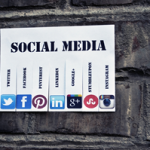Social media is a rapidly growing platform for marketers. Those who don’t embrace it are facing an increasing need to do so or fear being left behind. It has the opportunities for new, start-up brands or services to get the exposure their business needs, and it can equally serve older established brands by allowing more personal interaction with customers and clients.
However, with so much *noise* on many social media platforms, how do you know if your voice is going unheard? How do you know if you efforts are actually paying off? In essence, how do you measure social media success? It is essential to be able to directly trace any business garnered from social media, otherwise all your efforts might be in vain and essentially become one big time sink.
Below are five effective ways at measuring social media success (or failure).
1. Use Analytics
Analytics is essential for all websites and businesses regardless of social media. By being able to see a breakdown of your website’s traffic and interactions, and determining what percentage of that comes from social media, you will start to get a decent insight into the value of your social media efforts.
2. Tracking IDs
Like Analytics, using tracking IDs for any links you include on your social media marketing will give a very clear sign of success. Sites like bit.ly or goo.gl are the easiest way to shorten links and receive stats on how many clicks each link received.
3. Special Offers
If you use a special offer for your business, such as a coupon, a prize give-away or similar, and only promote that via social media, you will be able to directly trace any sign-ups or visits to those offers.
4. Finding Out Your Bottom Line
At the end of the day, social media efforts are usually for one purpose, increasing sales. If your bottom line sales do not alter much despite starting a new social media campaign (or pausing one temporarily), then chances are, your efforts are not necessary.
5. Significance
How significant a part in your business plan is social media? Some businesses rely almost solely on social media to get traffic, sales, and business, while for others, social media represents only a small aspect of business versus a large amount of time needed. If you can work out how well your business functions with or without social media, you will be able to analyse whether or not it is successful.
I find that newer businesses tend to rely more heavily on social media to get themselves heard, whereas the larger, established businesses have social accounts just as token gestures, almost like they are there to keep up appearances.
Conclusion
Depending on the needs of your business, there are different effective ways at measuring social media success.
If you are purely interested in traffic and generating interest, then tracking IDs and Analytics are going to be a simple, clear way of determining success, while large, already established businesses might have to do more testing and tweaking in order to find out the concluding results. In the end, it comes down to testing and tracking.
Our guest blogger: Naomi Vega is a freelance writer with interest in mobile marketing. She has more than five years experience in mobile and text marketing industry. She is currently working as a freelance writer for Trumpia.


